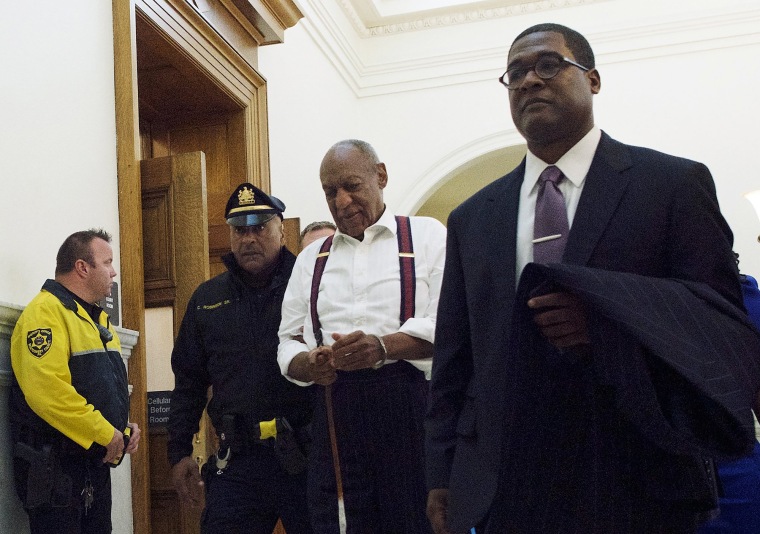Bill Cosby is going to prison — the final stage in a precipitous fall from grace for a once revered actor and comedian, but also perhaps the first step in holding high-profile men accused of sexual misconduct accountable in the era of #MeToo.
“It is time for justice,” Judge Steven T. O’Neill said on Tuesday in sentencing Cosby, 81, to three to 10 years in prison for drugging and sexually assaulting Andrea Constand, then women’s basketball administrator at Temple University, in 2004.
Once regarded as “America’s dad” as Dr. Heathcliff Huxtable in "The Cosby Show," Cosby left court a convicted sex offender and “sexually violent predator,” as deemed by the judge.
The conviction and sentence are “major ground gains in the territorial battle that is the MeToo struggle," said Donnell Alexander, a Los Angeles-based writer who focuses on culture and race.
But Cosby's downfall itself has wider meaning within the national movement against sexual assault and harassment, Alexander said, especially given what is going on with Judge Brett Kavanaugh, the Supreme Court nominee facing several allegations of sexual misconduct as a teenager.
"The sentence plays as a blow against big-picture respectability politics," Alexander said.
“Whatever contributes to the discrediting of cultural conservatives whose hypocrisy is bottomless? That’s great for American culture in the long term,” he said. “We’re in the final years of there being expectation that powerful old guys get carte blanche with women, and Cosby’s conviction announces that the old days are over like nothing prior.”
While seeing “an interesting interplay of gender and race dynamics in the Bill Cosby case,” Vinay Harpalani, an associate professor at Savannah Law School and a visiting professor at Drake University Law School, rejects the notion that Cosby is the face of the #MeToo movement.
“The women who are survivors of Bill Cosby's sexual assaults should be our foremost concern here, in terms of both justice and healing," he said. "If anyone should be the ‘face’ of the #MeToo movement, I think it should be the survivors of sexual assault. I frame the movement in a positive light here.”
One aspect of the case's racial dynamic was the reputation Cosby built in the black community as a philanthropist, which helped to solidify his public image. For example, he and his wife, Camille, donated $20 million to Atlanta’s Spelman College in 1988, which at the time was the largest contribution ever to a historically black college or university. Spelman and other beneficiaries of Cosby’s largesse have since distanced themselves from Cosby and his funding. (Cosby also resigned from the board of trustees of Temple, his alma mater, and the university rescinded his honorary doctorate.)
As Cosby cultivated a squeaky-clean image and father figure persona on television, he also drew the ire of some African-Americans for talking down to the black community, particularly those in poverty. His infamous 2004 speech to the NAACP, known as the “pound cake” speech, may have been his undoing, if not his comeuppance in the eyes of some observers.
“People getting shot in the back of the head over a piece of pound cake! Then we all run out and are outraged, ‘The cops shouldn’t have shot him.’ What the hell was he doing with the pound cake in his hand?” Cosby said. “Ladies and gentlemen, in our cities and public schools we have 50 percent drop out. In our own neighborhood, we have men in prison. No longer is a person embarrassed because they’re pregnant without a husband. No longer is a boy considered an embarrassment if he tries to run away from being the father of the unmarried child.”
When a federal judge decided to unseal court documents in which Cosby admitted he had drugged a woman with whom he wanted to have sex, he referred to Cosby’s speech.
Judge Eduardo Robreno, in a 2015 court memorandum, found that Cosby had "voluntarily narrowed the zone of privacy that he is entitled to claim" because he had “donned the mantle of public moralist and mounted the proverbial electronic or print soap box to volunteer his views on, among other things, childrearing, family life, education, and crime."
The "pound cake" speech didn't sit well either with Anthea Butler, an associate professor of religious and Africana studies at the University of Pennsylvania, which rescinded Cosby's honorary degree in March.
“Bill Cosby was abusing and raping women while telling African-Americans to pull their pants up. Perhaps he should have kept his pants up as well,” she said. "His fall is a reminder that respectability politics do not make a person moral."
Harpalani resists the urge to say black people did not support Cosby because of the "pound cake" speech and because he blamed black communities for racial inequality.
“This may lead some people to say that he got what he deserved," Harpalani said. "But I think that, by and large, black people rejected Bill Cosby because the evidence against him was so strong, and because the women's stories were numerous and credible,” he said, adding that black people will not simply act in racial solidarity regardless of facts.
“The history of black men being lynched for even suspicion of raping white women, or even seeming interested in white women, is too long and salient to ignore," Harpalani said.
As Cosby was immediately taken to prison after his sentencing on Tuesday, other powerful men accused of sexual crimes, like Harvey Weinstein, have not yet faced their accusers in court.
But the fall of Bill Cosby is still instructive in the era of #MeToo and #WhyIdidntReport, as more women come forward with their stories of abuse, and struggle to be heard and believed.
“Finally, the fact that Camille Cosby continues to stand by her man is also an indictment of the peculiar ways that women will side with abusers before other women,” Butler said.
